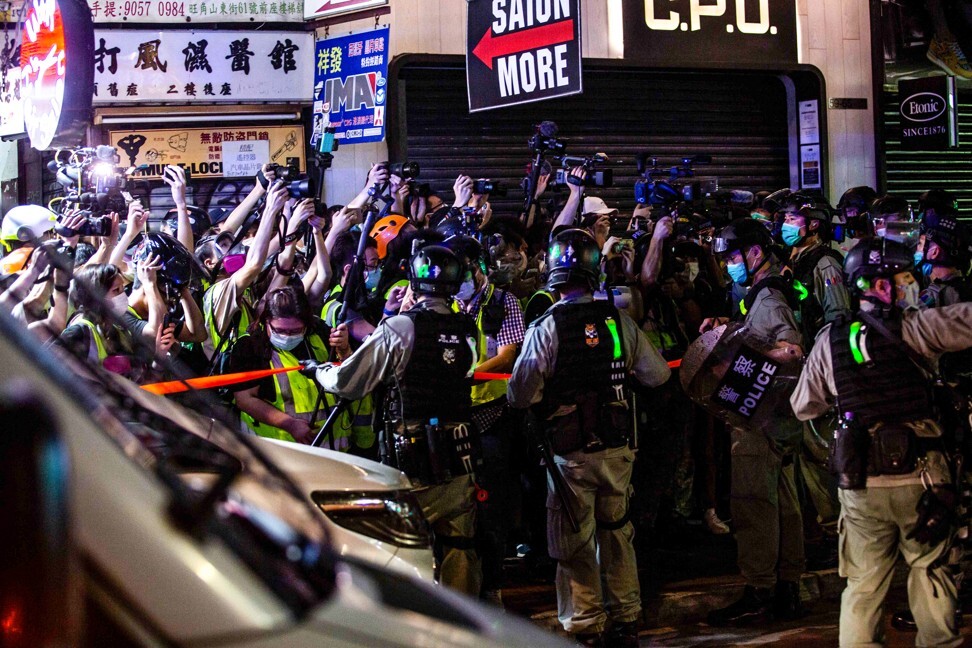
Seven Hong Kong journalism schools blast police’s media access restrictions, warning of threat to city freedoms
- Universities among those demanding police reverse decision to limit access for some journalists, in joint statement condemning ‘ill-advised’ policy
- Police say guideline changes offer more transparency and do not impinge on press freedom
Seven Hong Kong journalism schools have slammed police for limiting access to press briefings and restricted areas to only media from government-recognised news outlets, warning the move taking effect on Wednesday will damage city freedoms.
Hong Kong police move to limit access to press briefings draws fire
“We are concerned that the new policy would amount to giving clear instructions to officers to disperse non-mainstream journalists who have done no wrong and only exercising their right to gather information,” said the statement, which was drafted by the journalism department of Baptist University.
The Hong Kong Journalists Association (HKJA) said it was taking legal advice and might consider applying for a judicial review to see if the amended guidelines infringed Basic Law guarantees of press freedom.
The changes would mean that some freelancers, student reporters, and unregistered new media outlets would not be included. Internationally recognised media outlets would not be affected.
While all journalists can still cover incidents and protests in public areas, the guidelines state that officers are not obliged to help them, and they can be subject to criminal offences, including attending an illegal assembly or violating social-distancing rules.
Those not recognised by the force would be banned from police-controlled events and other cordoned-off outdoor activities.

Chief Superintendent Kwok Ka-chuen, of police’s public relations branch, reiterated on Wednesday that the changes provided more objective grounds for the force to define who should be allowed to report in specific circumstances.
“There are over 200 media organisations in the Information Services Department system. It is definitely not limiting press freedom, but instead, it’s more transparent,” he told a radio programme, adding the Police General Orders had not been amended for two decades, with online media outlets not included in the original guidelines.
Kwok added that over the past year, the force on occasion witnessed very young reporters, aged 12 or 13, at protests, which he said raised concerns for their safety.
Police scheme giving only ‘trusted media’ access sparks backlash
The journalism schools at Baptist, Hong Kong, Chinese, City, Hang Seng and Shue Yan universities issued their joint statement late on Tuesday. It was later signed by Chu Hai College’s journalism department.
They acknowledged the difficulties faced by frontline officers in distinguishing journalists from others attending protests, but said the effect of the new policy was to curtail the freedom to report.
“As part of our education, our students have been covering newsworthy happenings, and they follow the same code of ethics as professionals do by acting fairly and honestly,” the schools said.
“We cannot accept that they would be barred from covering certain newsworthy events merely because the student or independent media they work for are not registered with the [Information Services Department system].”
Student reporters from five local universities also issued a joint statement, accusing police of introducing an official licensing system for journalists, to suppress most online, citizen and school media.

Chan Wai-lok, chief editor of the student newspaper PressCom at Polytechnic University, said he expected the new guidelines would hinder its coverage of future protests.
“We thought of not sending our reporters to the sites, but we believe this is what reporters should do. Compared with the mainstream media, sometimes student journalists can film and get footage with more details during anti-government protests,” he said.
Meanwhile, HKJA chairman Chris Yeung Kin-hing said they would seek legal advice and would not rule out the possibility of a judicial review.
Hong Kong police chief ‘sorry’ over journalists’ mistreatment
“The Information Services Department’s system was only used to issue press releases and invitations, but not a recognised or registered system,” he said.
“Police are trying to confuse the public, and set up a government licensing system this time. We will seek legal advice to see if the move has infringed the Basic Law.”
Earlier on Tuesday, HKJA, along with unions relating to various local mainstream media including Ming Pao, Next Media and RTHK, also released a joint statement demanding police reverse the change.
The Hong Kong News Executives’ Association also expressed serious concerns over the amendment. It said police should ensure reporters would not be subject to unnecessary or unreasonable restrictions while working.

